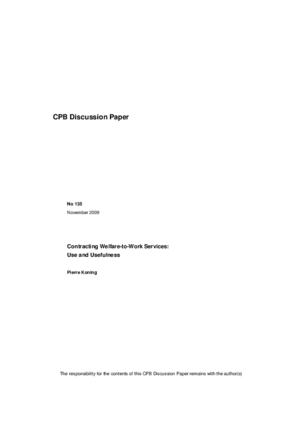Contracting welfare-to-work services: use and usefulness
Plaatsingsbonussen bij re-integratie hebben nauwelijks ongewenste effecten
We are sorry, unfortunately there is no English translation of this page.
This paper contributes to the broad literature on public services contracting in two ways: We provide an empirical analysis of contracting decisions in the provision of welfare-to-work (WTW) services, and we explicitly model two forms of external provision of WTW services by municipalities.
We estimate both the WTW-contracting decisions of Dutch municipalities and their impact on the performance, measured as the fraction of Social Assistance recipients. The two forms of external provision are (1) Contracting with other municipalities and/or (2) Contracting-out services to private providers.
Our findings suggest that contracting decisions are predominantly driven by cost considerations, both for the decision to contract with other municipalities and the share of contracting out to private providers. Municipalities with low WTW budgets or facing budget constraints are more likely to contract with external parties – presumably this reduces their costs and the risk of future budget deficits. We do not find contracting decisions to affect the performance of municipalities, measured as the use, inflow or outflow out of the SA scheme. From this alone, however, we cannot conclude that both the three provision modes are equally cost-effective too, as external provision may be less costly.
